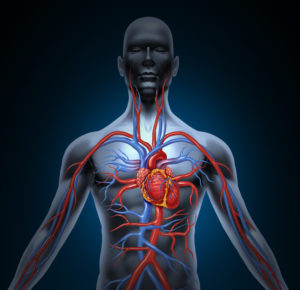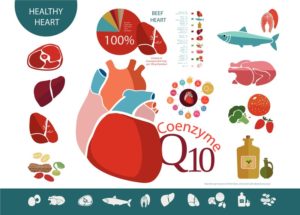Coenzyme Q10 (CoQ10) is an antioxidant that your body produces naturally. Your cells use CoQ10 for growth and maintenance. It is a fat-soluble substance which resembles a vitamin.

It is present in every cell in our body (hence the other name of CoQ10 – Ubiquinone, from ubiquitous = present everywhere, omnipresent) and is highly concentrated especially in the cells of the heart as this organ plays the main role in our body’s energy supply process. It comes in two forms: ubiquinol, the active antioxidant form, and ubiquinone, the oxidized form, which the body partially converts to ubiquinol. Many multi-ingredient supplements contain both these forms of CoQ10.
CoQ10 is involved in a number of biological functions including helping the human body to produce energy, neutralizing free radicals (anti-oxidant capabilities) and keeping cells of body and skin healthy and running smoothly.
A young body has the ability to produce as much CoQ10 as it needs. However, various factors such as aging and stress can lower levels of CoQ10. As a result, the ability of cells to regenerate and withstand stress declines.

CoQ10 has been researched extensively. The evidence shows that it is useful to treat:
- Heart conditions. CoQ10 has been shown to improve symptoms of congestive heart failure. Although findings are mixed, CoQ10 might help reduce blood pressure. Some research also suggests that when combined with other nutrients, CoQ10 might aid recovery in people who’ve had bypass and heart valve surgeries.
- Parkinson’s disease. Early research suggests that high doses of CoQ10 might be beneficial for people in the early stages of this progressive disorder of the nervous system that affects movement.
- Statin-induced myopathy. Some research suggests that CoQ10 might help ease muscle weakness sometimes associated with taking statins. This is because statins lowers your body’s levels of CoQ10 by up to 40%.
- Migraines. Some research suggests that CoQ10 might decrease the frequency of these headaches.
- Physical performance. Because CoQ10 is involved in energy production, it’s believed that this supplement might improve your physical performance. Research in this area has produced mixed results, however.
CoQ10 is naturally found in high levels in organ meats such as liver, kidney, and heart, as well as in beef, sardines, and mackerel. Vegetarians or vegans who do not eat these foods should find a suitable alternative. Luckily, vegetable sources of CoQ10 include spinach, broccoli, and cauliflower. Legumes such as peanuts and soybeans are the best non-animal sources of the substance.

It is safe to take CoQ10 up to 1,000 mg/day. Studies have not reported serious side effects related to CoQ10 use. It is also very important to remember that taking CoQ10 with meals may significantly increase its absorption.
